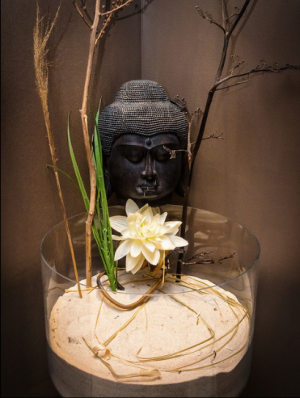Feng Shui is the practice of bringing good fortune by achieving balance between various elements. In the US, more people are beginning to consult Feng Shui experts in decorating their homes. For you to understand what they say, you need to learn the basic Feng Shui areas that need your attention so you will be able to decorate it properly.
The first step is to draw a layout of your home. When you are doing it, you are noting down the north points in the house.
Then it is time to work on the door. Ideally, the front and back door must never line up with each other. This is because according to the principles of Feng Shui, energy that enters the house will just go out without bringing any benefits to the homeowner. If this is the case in your home, put a plant or any other obstruction with an angled throw rug to encourage a path in a sideways direction.
To bring more energy in the home, bring in some light. This doesn’t mean turning the lights on but simply opening up the curtains so the sun can come in. You should also add green plants since in Feng Shui, the color itself brings joy and happiness. Other decorative items you can use include mirrors, wind chimes and brighter colors.
You can also bring good fortune to the home by putting in an indoor water fountain. This is because water refreshes Chi. At the same time, you can throw in some goldfish as this also encourages wealth. Just make sure to keep the pond clean and never let it stagnate.
Red is a very strong color in Feng Shui because it is hot, passionate, rich and celebratory. You must use this color for a living room set because too much of it may bring restlessness, a burst of anger and over stimulation. If you want to use it, use it only for details and accessories.
When you note down the north point of the home, it will be easy for you to work in other areas such as the southwest area of the house. This area is vital because it will allow you to have satisfying relationships. You can do this by eliminating clutter and replacing it with symbolic items ideally in pairs. Some good examples are candles and other figurines. Never make the mistake of putting wooden or green items here.
As for your dining room, the best ones to get are circles as this symbolizes heavenly blessings. The chairs should be even in number and comfortable to sit in. The décor should be simple so people will not get distracted and be more focused on having a good meal.
Watch out for exposed beams. If there are, these should be covered up because it creates an oppressive downward energetic flow that may cause health problems and other misfortunes in your life. The other option is to have two Feng Shui flutes installed at 45 degree angles on the beam, one at each end.
As for the bedroom, make sure that the bed is not directly facing the door. You shouldn’t also place a mirror on the opposite side of the bed as this could attract a third party into your relationship.
Peace and prosperity can only be achieved by decorating your home with Feng Shui. You can start now with some of the basics then get help if you think you need it.

